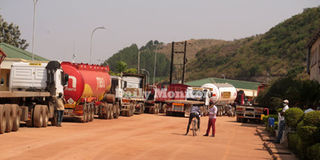Uganda-Rwanda border medics strike over pay

Trucks parked at the Mirama hills Border post awaiting medical clearance. PHOTO | PEREZ RUMANZI
Health workers implementing Covid-19 guidelines at Mirama Hills on the Rwanda-Uganda border have gone on strike over non-payment of their allowances by Ministry of Health for more than six months.
The strike crippled business and traffic at the border point yesterday.
The medical workers went on strike on Saturday afternoon and did not show up for duty following the ministry’s communication that they will be appointed as permanent staff and, therefore, they would not be entitled to allowances. The health workers are demanding allowances from October last year.
“We have been here at the border since March 2020. We have worked hard and tried to prevent more infections. Some of us have been infected but healed. They first paid us well, later cut the allowances and we kept calm.
But they are no longer paying us while we continue to risk our lives and keep away from our homes,” a medical worker told Daily Monitor on condition of anonymity for fear of reprisal.
The medical officer-in-charge of Mirama Hills border point, Dr Frank Byamukama, said there have been various categories of health workers and statisticians working at the customs centre since Covid-19 testing started there last year.
He said the medics were being facilitated with meals and housing by the Ministry of Health but they have not received their remuneration since October.
The Ntungamo District health officer, Dr Richard Bakamuturaki, said he was engaging the striking medical workers after speaking to the ministry over the issue. He said the workers agreed to return to duty.
“I have talked to the Ministry of Health permanent secretary, Dr Diana Atwine, who said they regret the non-payment of the workers. She said the challenge was not the ministry’s making but the finance system which delayed the payment. She promised to handle it soon,” Dr Bakamuturaki said.
He said the medical workers are using their salaries to pay for meals, housing and general welfare away from their duty stations and families, which is a matter of big concern.
The ministry has since ordered border districts to deploy staff permanently at the border other than having a few seconded to work there on allowances, which is more expensive on the side of government.
However, Dr Bakamuturaki said this may not be tenable because for a long time the district has not had enough staff to cater for all the health challenges in the area.
The medical workers at the border had been complemented by at least 12 Red Cross medical volunteers who were withdrawn in February after nine months of service. The organisation ran out of funds and donors did not renew the funding, according to Ntungamo Red Cross manager Livingstone Nsabimana.
The health workers are now responsible for all the medical services at the border point, including screening both staff and truck drivers for Covid-19, sample collection, isolation of suspects, clearing of drivers and fumigation of the buildings.
No single truck is allowed into Uganda without the driver and the other occupants presenting their Covid-19 results of a test taken in the last 48 hours. Such tests are normally done at the border.
Yesterday morning, more than 200 trucks were stranded at the border following the medical workers’ strike.




